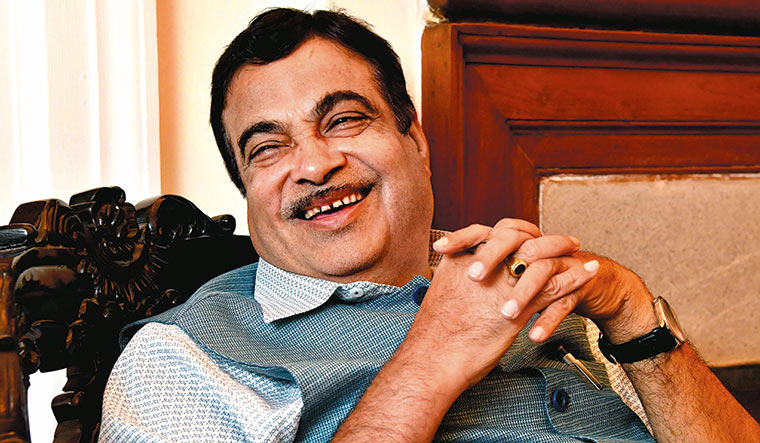Union Minister Nitin Gadkari sparked fresh debate on the topic of origins of the novel coronavirus, calling it "artificial" and prepared in a lab. In an interview with NDTV, he said, "We have to understand the art of living with corona. This is not a natural virus. It is an artificial virus and now many countries in the whole world—they are researching on it for a vaccine. The vaccine is not available, it is expected that vaccine will be available as soon as possible, then there will be no problem".
A few days before that, in an interview with a news magazine, the minister had said he does not ascribe to the theory that the COVID-19 virus is natural. He had said that the virus is an artificial one, prepared in a lab. "The scientific community is unable to come up with a solution to the virus as it is not a natural one," he said.
Gadkari is not the first political figure in the world to make that claim. US president Donald Trump and his administration are the most vociferous proponents of the theories surrounding the laboratory origins of SARS-CoV-2 (scientific name given to the virus), calling COVID-19 the 'Wuhan Virus'. This had sparked furious reactions from Beijing, with the latter repeatedly pushing back, pointing to many missteps made by American officials in their own fight against the outbreak. The diplomatic relations between the two trade rivals are now at an all-time low.
The first speculations of Wuhan lab being the source of the coronavirus came around March when theories were abound of Chinese warfare agents smuggling the virus from Canada. The Wuhan Institute of Virology National Biosafety Laboratory, located only 32 kms away from the virus epicentre Hunan Seafood market, is a Level 4 certified lab that is capable of conducting research activities involving Ebola, Nipah and other deadly viruses.
Debate over origins of the virus
Trump had announced that his government was investigating the source of the coronavirus, and threatened China with severe action in case the country turned out to have been ‘knowingly responsible’ for COVID-19. On Thursday, a group of nine influential US senators introduced a legislation in Congress, seeking to authorise the president to impose sanctions on China if it fails to cooperate and provide a full accounting of the events leading up to the outbreak of the coronavirus. "China must be held accountable, and if it does not cooperate with these reasonable measures to fairly investigate the origins of the coronavirus, closes wet markets and releases pro-democracy advocates arrested during the pandemic, then it should face the serious consequences," according to the legislation.
US Secretary of State Mike Pompeo said there was significant evidence that the virus emanated from a laboratory in Wuhan. "Remember, China has a history of infecting the world, and they have a history of running substandard laboratories. These are not the first times that we've had a world exposed to viruses as a result of failures in a Chinese lab. While the intelligence community continues to do its work, they should continue to do that, and verify so that we are certain, I can tell you that there is a significant amount of evidence that this came from that laboratory in Wuhan," he said.
What is the verdict within the scientific community? As of now, there is no concrete evidence to pinpoint the source of the virus. In a recent research report in the journal Current Biology, scientists had identified a close relative of SARS-CoV-2 in bats, which could be evidence that the virus behind the COVID-19 disease evolved naturally. While researchers consider bats the most likely natural hosts for the virus, the origins of the virus are still unclear, with some suggesting other sources like pangolins.
"Since the discovery of SARS-CoV-2, there have been a number of unfounded suggestions that the virus has a laboratory origin," according to the study. "In particular, it has been proposed the S1/S2 insertion is highly unusual and perhaps indicative of laboratory manipulation. Our paper shows very clearly that these events occur naturally in wildlife. This provides strong evidence against SARS-CoV-2 being a laboratory escape."
In March, a study published in Nature Medicine had concluded that SARS-CoV-2 was not a “laboratory construct or a purposefully manipulated virus”, on the basis that certain aspects of the virus were too efficient to be designed by humans. The spike protein of the novel coronavirus was so effective at binding the human cells that the researchers said it was the result of natural selection and not the product of genetic engineering. They said this was supported by data on SARS-CoV-2's overall molecular structure. If the new coronavirus were engineered as a pathogen, the scientists said, it must have been constructed from the backbone of a virus already known to cause illness. But the study found that SARS-CoV-2's backbone differed substantially from those of already known coronaviruses, and mostly resembled related viruses found in bats and pangolins. "These two features of the virus, the mutations in the RBD portion of the spike protein and its distinct backbone, rules out laboratory manipulation as a potential origin for SARS-CoV-2," according to the study.
The World Health Organisation (WHO) had attempted to quash rumours that the virus's lab origins, as spokesperson Fadela Chaib told a news briefing in Geneva that “all available evidence suggests the virus has an animal origin and is not manipulated or constructed in a lab or somewhere else".
China is resisting mounting pressure from the US and the leaders of many countries for an inquiry into the origin of the virus, which was initially stated to have emerged from a wet market in Wuhan selling live animals located close to WIV. On April 29, state television CGTN reported that US scientists are working with their Chinese counterparts to investigate the origin of the coronavirus, a prime demand of Trump and several other countries.


